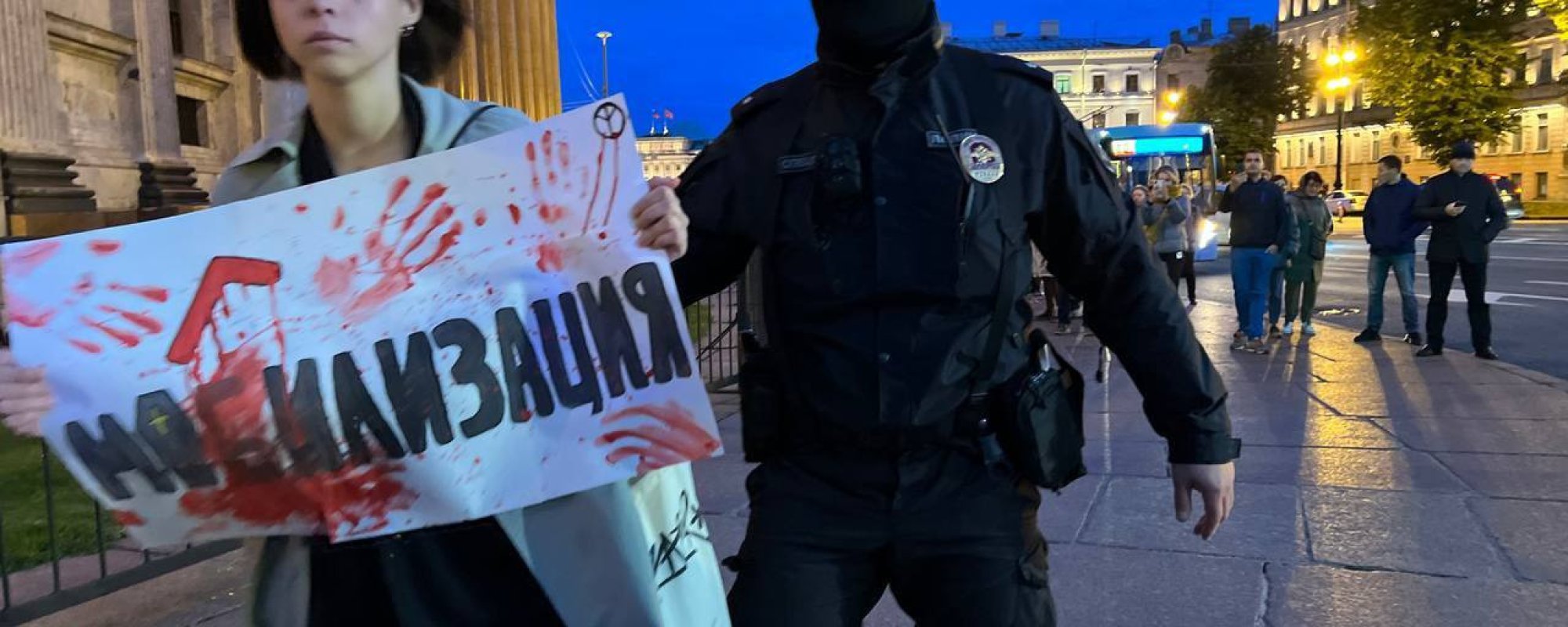On 21 September, after a long break, mass anti-war rallies broke out across Russia once again. They were triggered by the announcement of mobilisation. Arrests have taken place in 39 cities; at least 1,310 people have been detained. The police were violent; in several cities, journalists were detained.
So far, one criminal case is known to have been opened: in Yekaterinburg, a young woman has been charged with Art. 318 of the Criminal Code (violence against a police officer). In many cities, defense representatives were not admitted to see detainees; in some precincts the «Fortress» plan was enacted — which means that entry was completely blocked.
Since the end of February, when the Russian army invaded Ukraine, Vladimir Putin and other top officials have reiterated that the «special military operation» would run its course without mobilisation. Plans for a quick takeover of Ukraine proved untenable however, and by September, the Ukrainian armed forces had seized the initiative and launched a successful counter-offensive.
At the beginning of the week, pro-Russian authorities in the occupied territories and the unrecognised Donbass republics announced that they would hold referenda as soon as possible in order to become part of the Russian Federation. The Russian State Duma quickly introduced criminal penalties for looting and surrendering, and toughened the punishment for leaving a military unit. On the morning of 21 September, President Vladimir Putin announced a partial mobilisation.
According to the authorities, the state needs 300,000 mobilised soldiers who possess «relevant» experience and military specialty. But the information about the number and selection criteria for those who will be mobilised is in a secret, unpublished part of the decree. In addition, the document does not mention that the mobilisation is «partial» and simply calls it «mobilisation». Where and when it will end remains unclear.
Anti-war protests in Russia have not stopped since February 24: as of September 21, we have counted 16,500 arrests; the police have drawn up almost 4000 administrative protocols under the article on discrediting the armed forces; and 245 people have become defendants in criminal cases. However, there have been no large mass rallies for a long time. Putin’s decree brought people back to the streets — all-day protests broke out in many cities, supported by many political forces.
Saint-Petersburg
At least 536 detainees. In the northern capital, phones were confiscated, people were plucked out of the crowd, put on their knees during detention, and pushed into overcrowded paddy wagons. Some people were beaten.
Moscow
At least 530 detainees. Some people were beaten; one girl lost consciousness during her arrest. Some detainees had their phones taken away. There are isolated cases of preventive detentions in the subway using the facial recognition system. According to information from 15 police departments, detained men were handed call-up papers demanding that they report to voenkomats (military conscription offices). In the Sokolinaya Gora precinct, a detainee was threatened with a criminal case and 10 years in prison for refusing to acknowledge the receipt of call-up papers.
Yekaterinburg
At least 47 detainees. One of the detainees is a former paratrooper who protested with a poster of Salvador Dali’s painting «The Face of War».
Perm
At least 30 detainees.
Chelyabinsk
At least 26 detainees. Cossacks took part in making arrests.
Ufa
At least 23 detainees. Police confiscated phones.
Krasnoyarsk
At least 19 detainees.
Voronezh
At least 17 detainees. Detained men were handed call-up papers demanding that they report to voenkomats (military conscription offices).
Krasnodar
At least 14 detainees. A paddy wagon broke down while transporting people to the precinct.
Tver
At least 13 detainees.
Saratov
At least 12 detainees.
Kaliningrad and Ryazan
At least 11 detainees in each city. People got detained while doing a roundelay.
Irkutsk
At least 9 detainees. All were released under a pledge to appear in court; they were interviewed by Center «E» operatives.
Petrozavodsk and Irkutsk
At least 9 detainees in each city.
Arkhangelsk, Tula
At least 8 detainees.
Novosibirsk and Korolev
At least 6 detainees in each city. A cyclist was detained in Novosibirsk.
Ulan-Ude, Tomsk
At least 4 detainees in each city.
Zheleznogorsk
At least 3 detainees.
Izhevsk, Samara, Salavat, Volgograd, Vologda, Yakutsk, Kazan
At least 2 detainees in each city. An arrest in Izhevsk happened because the detainees were singing Yegor Letov’s songs. In Samara, a woman was detained with two kids and a pram. In Yakutsk, the police confiscated phones.
Tyumen, Ivanovo, Syktyvkar, Surgut, Nizhny Novgorod, Kaluga, Vyatskije Polyany, Smolensk, Belgorod, Syktyvkar
At least 1 detainee in each city.



